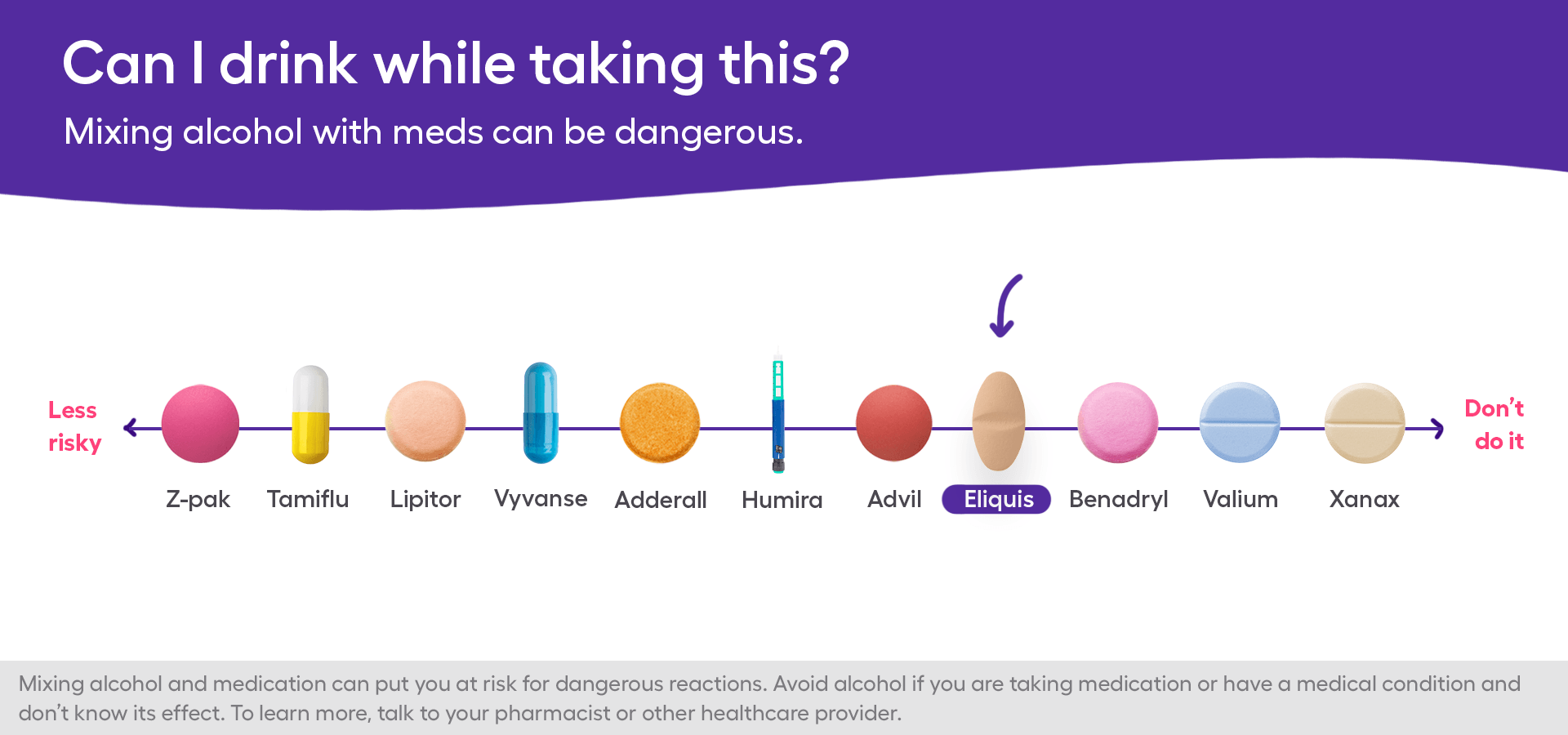Key takeaways
Eliquis, a popular blood thinner prescribed to reduce blood clotting, has seen a significant increase in prescriptions, moving up the ranks to become one of the most prescribed drugs in the U.S.
Moderate alcohol consumption does not directly interact with Eliquis, but it may act as a blood thinner, potentially increasing the risk of bleeding, especially when consumed with Eliquis.
Excessive alcohol use can lead to poor anticoagulation control in patients taking blood thinners like Eliquis, resulting in a higher risk of major hemorrhages.
While the prescribing information for Eliquis does not specifically warn against alcohol use, individuals should consult their healthcare provider for personalized advice due to the potential increased risk of bleeding and other alcohol-related health complications.
In the pharmacy where I work, I recently noticed a lot of prescriptions for the blood thinner Eliquis. It feels like it’s flying off the shelves. I looked up the statistics, and it wasn’t just my imagination. Eliquis was the 66th most prescribed drug in the U.S. in 2018, up 27 spots from the previous year when it ranked 93. (In 2014, it was number 308, so it’s come a long way.)
In fact, there were more than 12 million prescriptions filled for Eliquis in 2018. This newer medication has nearly caught up to warfarin—also known by its brand name Coumadin—a classic blood thinner that’s been used since 1954.
As prescriptions increase, so do patient questions, and one common query is, “Can I mix Eliquis and alcohol?” First, let’s talk about the uses of Eliquis and other safety information.
RELATED: Eliquis coupons | Eliquis details
What is Eliquis?
Eliquis is a blood thinner, also known as an anticoagulant, which reduces blood clotting. It contains the ingredient apixaban. Eliquis was approved in 2012 and has several indications. Eliquis can be used to:
- Lower the risk of stroke and embolism (blocking of an artery) in patients with nonvalvular atrial fibrillation.
- Prevent deep vein thrombosis (DVT), which can lead to pulmonary embolism (PE), in patients who have had hip or knee replacement surgery.
- Treat DVT
- Treat PE
- Decrease the risk of a recurrence of DVT and PE
Eliquis is categorized as a Factor Xa inhibitor. Other medications in this category include Xarelto (rivaroxaban), Savaysa (edoxaban), and Arixtra (fondaparinux). Factor Xa inhibitors have an anticoagulation effect by blocking factor Xa, which therefore helps decrease blood clot production.
What are the side effects of Eliquis?
The most common side effects of Eliquis are:
- Bleeding (signs of bleeding may include easy bruising, bleeding gums, or nosebleeds)
- Nausea
- Low red blood cells (anemia)
Serious side effects of Eliquis may include:
- Severe bleeding
- Fainting
- Hypersensitivity reaction
- Bleeding between the brain and skull (epidural hematoma)
- An accumulation of blood that can compress the spinal cord (spinal hematoma)
- Low platelet count (thrombocytopenia)
- Formation of blood clots (thrombosis) if the medication is stopped too soon
Eliquis has a boxed, or black box, warning. This is the strongest warning required by the FDA. The warning includes risks such as epidural or spinal hematoma (which could result in paralysis). It recommends not stopping Eliquis before completing therapy, and avoiding anti-inflammatory drugs, other blood thinners, and platelet inhibitors to decrease risk.
Taking Eliquis puts you at increased risk for bleeding. Eliquis can cause serious, life-threatening, or even fatal bleeding. Taking Eliquis with other medications that affect bleeding/clotting increases the risk even further. This includes other anticoagulants—such as warfarin, Pradaxa (dabigatran), Brilinta, (ticagrelor), or heparin, or nonsteroidal anti-inflammatory drugs (NSAIDs). Signs and symptoms of blood loss indicate a medical emergency and should receive emergency medical attention.
Eliquis also has other warnings, side effects, and drug interactions. Before taking Eliquis, talk to your healthcare provider about all of your medical conditions and medical history to make sure Eliquis is safe for you. Tell your physician about all of the medications you take, including prescription medicines, over-the-counter drugs, and vitamins or supplements.
Can you mix Eliquis and alcohol?
The prescribing information for Eliquis does not warn against alcohol use. Does this mean you’re free to imbibe? Not quite yet.
Although alcohol does not interact with the mechanism of Eliquis, some evidence suggests that moderate alcohol drinking can act as a blood thinner. According to the American Blood Clot Association, one study showed that the alcohol content in 1 or 2 drinks could potentially decrease blood clotting. Although these study results were noted as incidental findings, it would seem that there is a potential for a higher risk of bleeding if alcohol does indeed decrease clotting—when taken with Eliquis.
Since Eliquis is a blood thinner and alcohol may act as a blood thinner, it is best to avoid alcohol intake (unless your healthcare provider gives you the green light to drink a small to moderate amount). This goes for all of the drugs in the class of Factor Xa inhibitors (Eliquis, Xarelto, Savaysa, Arixtra).
One study concluded that in patients who took an anticoagulant and had alcohol abuse problems, “anticoagulation control is particularly poor.” Major hemorrhages were more common in this group.
Too much alcohol can contribute to many diseases of organs such as the liver, heart, and pancreas and is a factor in developing heart disease. Consuming more than two servings of alcohol every day can increase the risk of developing blood clots. This could theoretically work against Eliquis.
Generally speaking, The American Blood Clot Association recommends that anyone with a clotting disorder or heart disease should use extreme caution when drinking. Inability to clot properly can be very dangerous.
RELATED: Cardiac arrest vs. heart attack
Bottoms up?
Although the prescribing information for Eliquis does not explicitly warn against consuming alcohol, there are many individual factors that can affect a person’s reaction to Eliquis and drinking alcohol. Long-term excessive alcohol consumption can also cause complications such as cardiovascular disease, high blood pressure, and stroke.
Check in with your healthcare provider, who can evaluate your unique situation and provide medical advice on the risk of mixing alcohol and Eliquis. Based on your medical history, risk factors, medical conditions, and medications you take, your healthcare may allow for moderate alcohol consumption or advise you to avoid alcohol altogether.





